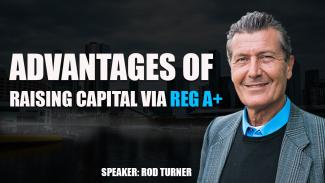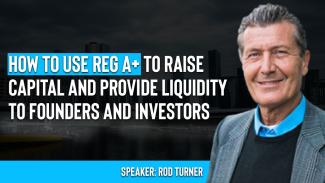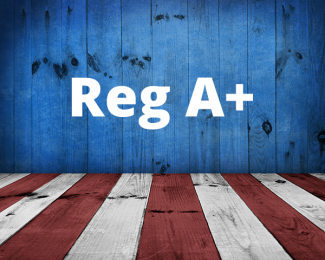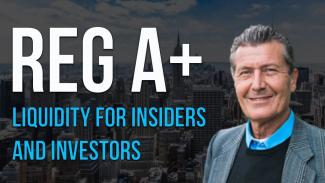Use the Chapters list below to select the part of the video you want to watch.
Click here to watch the full webinar.
Chapters:
- Listing options
- The Benefits of Listing your Company on an ATS Exchange
- ATS fees
- Advantages and disadvantages of listing on an ATS
- Listing on the NASDAQ/NYSE
- Direct listing on a major exchange
Disclaimer:
The content in this webinar is not and shall not be construed as investment advice. This information is meant to be informative and for general purposes only.
MSC is not a law firm, valuation service, underwriter, broker-dealer or Title III crowdfunding portal and we do not engage in any activities requiring any such registration. We do not provide advice on investments. MSC does not structure transactions. Do not interpret any advice from MSC staff as a replacement for advice from service providers in these professions.
(1).jpg)
Rod Turner
Rod Turner is the founder and CEO of Manhattan Street Capital, the #1 Growth Capital service for mature startups and mid-sized companies to raise capital using Regulation A+. Turner has played a key role in building successful companies including Symantec/Norton (SYMC), Ashton Tate, MicroPort, Knowledge Adventure, and more. He is an experienced investor who has built a Venture Capital business (Irvine Ventures) and has made angel and mezzanine investments in companies such as Bloom, Amyris (AMRS), Ask Jeeves, and eASIC.
www.ManhattanStreetCapital.com
Manhattan Street Capital, 5694 Mission Center Rd, Suite 602-468, San Diego, CA 92108.
THIS TEXT TRANSCRIPT HAS ERRORS IN IT THAT WERE CAUSED BY THE SPEECH TO TEXT CONVERSION SOFTWARE WE USED. DO NOT DEPEND ON THE TEXT TO BE ACCURATE. WATCH THE RELEVANT PARTS OF THE VIDEO TO MAKE SURE YOU ARE PROPERLY INFORMED. DO NOT DEPEND ON THIS TEXT TRANSCRIPTION TO BE ACCURATE OR REFLECTIVE OF THE STATEMENTS OR INTENT OF THE PRESENTERS.
Listing options then. I touched on a couple of these items. Firstly, you don't have to list the majority of companies that do reggae pluses do not list. Secondly, let's go down the, the stack you can list on an alternative trading system. We, if you go to the Manhattan Street Capital website, you see behind me at the top right corner, there's a search box. And if you type ATS in that search box, then you'll see our content describing alternative trading systems. Anyway, ATS is what I've said, it's a simpler method of listing. It's a new kind of exchange where brokers, stock brokers are allowed to do the extra filings in order to become an ats, an alternative trading system. And there's a large variety of them, probably 30 now that exist. There's too many, as is the case with new things, right? But that will, that'll settle down over time.
You can even get a private labeled ATS that you would use just for your investors in your company. Not to say that that's inexpensive, the way the level of integration that you would use and so forth will make it more expensive. But the point is that ATSs exist and that your, you have the same audit requirements as your reggae Plus already does a US gap audit once a year, six monthly management financials in the main. And once you've raised enough money and have enough liquidity to satisfy their, their requirements and their requirements vary depending which ATS you're talking with, then you can list your sale, your stock there, you still have to file with the states for secondary market resale. So it's about $10,000 a year cost to do that. And the, I would say different ATS is charged different fee structures, some of them more efficient in trading fees and so forth.
But you can get about a $10,000 listing fee and about $10,000 a year to stay listed on an ats. You can pay more than that of course, but I, I do know there are a number that are doing it around that price. So the big advantage though, the, the downside of these ATSs is that none of them have huge liquidity and you're not gonna get insanely high valuations. Of course, that's the downside, straightforward and understandable. The upside of though is that unlike on the OTC markets and on NASDAQ and nyse, stock brokerages are not allowed to make naked shorts. So management is gonna spend a lot less time worried about defending the stock price when you are on an ats. So you are providing liquidity to your investors, and if you're continuing to raise money by a reggae plus whilst listed on an ats, which is a good thing to do then you are establishing a price in the market by your marketing.
And obviously then it's down to you to deliver with the company, deliver good results, and communicate sufficiently to your investors. You are able in a reggae plus, as far as the SCC is concerned, you are able to list in Canada, you are able to list internationally. And you know, Asia has the number of exchanges that you can list on and so does Europe. So that's another option to consider. The S e c ignores those liquidity options as long as comp business, your company is conducting itself legitimately and by the rules that those markets impose, you're allowed to list there. But obviously that doesn't help us. Investors usually, or I would say doesn't help pretty clear cut. It doesn't help us investors. You can conduct an IPO via underwritten support to the NASDAQ or the N Y S E that has the market obviously right now is, is, is, is not as excited about IPOs of any stripe, right?
So we're not gonna see too many IPOs in the next few quarters here as the market's in, in the state that it's in currently. But when the market is warm enough that underwriters want to play, then you can conduct IPOs to the major exchanges in reggae plus Jing, the reggae Plus. It's not something you are restricted to doing after it. As soon as you've raised enough money from enough investors that you qualify then you can take your Reggae Plus and convert it into an IPO to those major exchanges. You don't necessar you have two options. You can do it via, you can do the last part via underwriters. So let's say you've already raised 16 million online in your Reg Plus, and now you want to go list, that's probably enough money, assuming your burn rate isn't excessive from enough investors to list. So 400 is a good number to start off with, but you'll be typically with 16 million, you'll have far more than 400 investors, then you want to have capacity left to raise to the, for the underwriters to make money, right?
You've gotta give them space to earn their keep to, to, to pay their bills. And so in doing so, let's say you, you, you give them another 10 million to go out and raise in the IPO part in their underwritten portion where they go to their broker dealer syndicate and raise that extra money, then you list. But you can also do a direct listing. And a direct listing is where you are. You've already raised the money, you already have enough investors, you already have enough money in the bank and you've satisfied the other listing requirements at nasdaq. Like, you know, when you look forward 18 months you're not gonna run out of money. You don't want companies to list that are, you know, likely to run out of money in that kind of timeframe for obvious reasons. So as long as you satisfy those listing requirements, then you can conduct a direct listing to the major exchanges without the use of a broker dealer or even an, or an underwriter or even a broker dealer.
So that's a lovely, lovely thing. What I like about that is it's like much less expensive. You are able to do so even when underwriters won't play. So you hear this phrase, I've heard it many times over the years, the IPO window is closed, right? And what that means is you can't do IPOs unless you know it's the latest startup by someone like Elon Musk. You get a few, but very, very few. So in that context, what does that mean? It doesn't mean the SEC has said No, no, we're not gonna allow any registration statements or reggae plus IPOs anymore. No, no, no, they don't do that. They're not judging the merit of, of the case. They're not saying, No, you aren't good enough. You shouldn't go and market that company. It's the underwriters that say no, cuz it's not gonna work in their view, it's not worth their time.
They're gonna have to work too hard to raise the money to go list your company. They're the ones that close the door. So if you've already raised enough money from enough investors and satisfy the other requirements, you can do a direct listing. There's one that has been done via reggae plus a company called Atlas, and their ticket symbol is a M V, they're on the nasdaq, they went public at the beginning of October when public, they, their offering was a direct public listing. It wasn't an I P o a direct public listing, right? So I gave them, I gave them some advice in their preparations to do their direct listing. So I have some good awareness and we have a good awareness of how direct listings work because we've been preparing to help our clients do direct listings for some long time. I see it as a marvelous opportunity because it reduces costs significantly.
And again, it, you can, if the company is strong enough and the marketing forward is strong enough, if the investor interest is there that you already raised the money, then you can go list on the nasdaq. You just gotta make sure you are prepared for the rigors of being a public company on a major exchange, of course. But the opportunity to do it this way, you know, there's only been, there haven't been a large number of direct listings in total via the NASDAQ or the N Ys E, but those that have gone so far, almost all of them have been much larger companies and they usually involve underwriters that they were paying less so they weren't making huge savings because it's a new space, it's a new area.
THIS TEXT TRANSCRIPT HAS ERRORS IN IT THAT WERE CAUSED BY THE SPEECH TO TEXT CONVERSION SOFTWARE WE USED. DO NOT DEPEND ON THE TEXT TO BE ACCURATE. WATCH THE RELEVANT PARTS OF THE VIDEO TO MAKE SURE YOU ARE PROPERLY INFORMED. DO NOT DEPEND ON THIS TEXT TRANSCRIPTION TO BE ACCURATE OR REFLECTIVE OF THE STATEMENTS OR INTENT OF THE PRESENTERS.









